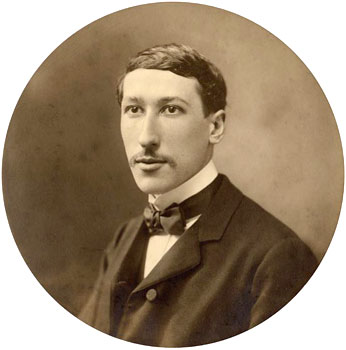“The “end of a world” never is and never can be anything but the end of an illusion.”
The Reign of Quantity and the Signs of the Times (1945)
René Guénon o Abd al-Wâhid Yahyâ fue un matemático, masón, filósofo, y esoterista francés.
De profesión matemático, es conocido por sus publicaciones de carácter filosófico espiritual y su esfuerzo en pro de la conservación y divulgación de la tradiciones espirituales. Fue un intelectual que sigue siendo una figura influyente en el dominio de la metafísica. Se le relaciona con Ananda Coomaraswamy, otro gran esoterista del siglo XX.
Gran estudioso de las doctrinas y de las religiones orientales, se esforzó por aportar a Occidente una visión no simplista del pensamiento oriental, especialmente de la India y por su defensa de las civilizaciones tradicionales frente a Occidente. En sus escritos, él se propone «exponer directamente algunos aspectos de las doctrinas metafísicas orientales»[1] y de «adaptar estas mismas doctrinas a los lectores occidentales, [...][2] siendo completamente fiel a su espíritu».[1]
Destaca, también, su crítica a la civilización occidental desde presupuestos metafísicos ―y no ideológicos ni políticos―.
Wikipedia

“The “end of a world” never is and never can be anything but the end of an illusion.”
The Reign of Quantity and the Signs of the Times (1945)
Fuente: The Crisis of the Modern World (1927), p. 47
Fuente: The Crisis of the Modern World (1927), p. 50
Fuente: The Crisis of the Modern World (1927), p. 93
Fuente: The Crisis of the Modern World (1927), p. 59
Fuente: The Crisis of the Modern World (1927), p. 98
Fuente: The Crisis of the Modern World (1927), p. 98
Initiation et réalisation spirituelle (Initiation And Spiritual Realization) (1952)
Fuente: The Crisis of the Modern World (1927), p. 103
Fuente: Spiritual Authority and Temporal Power (1929), p. 30
Fuente: The Crisis of the Modern World (1927), p. 99
Fuente: The Reign of Quantity and Signs of the Times (1945), p. 289
Fuente: The Crisis of the Modern World (1927), p. 75
Fuente: The Crisis of the Modern World (1927), p. 109
Introduction générale à l'étude des doctrines hindoues (Introduction to the Study of the Hindu Doctrines) (1921)
Fuente: The Crisis of the Modern World (1927), p. 51
Fuente: The Crisis of the Modern World (1927), pp. 97-98
La crise du monde moderne (The Crisis of the Modern World) (1927)
Fuente: The Reign of Quantity and Signs of the Times (1945), p. 288
“If an idea is true, it belongs equally to all who are capable of understanding it.”
Fuente: The Crisis of the Modern World (1927), p. 73
Fuente: The Crisis of the Modern World (1927), pp. 65-66
Fuente: The Crisis of the Modern World (1927), p. 56
Fuente: Spiritual Authority and Temporal Power (1929), pp. 77–78
Fuente: Spiritual Authority and Temporal Power (1929), p. 77
Fuente: Spiritual Authority and Temporal Power (1929), p. 73
Fuente: Spiritual Authority and Temporal Power (1929), p. 62
Fuente: Spiritual Authority and Temporal Power (1929), p. 18